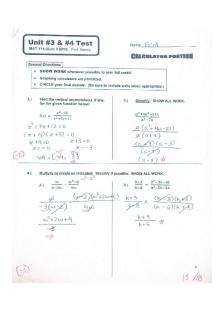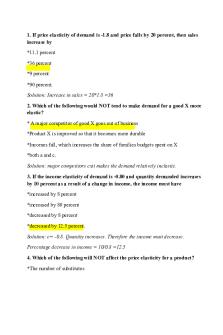TEST 2002H Answers PDF

| Title | TEST 2002H Answers |
|---|---|
| Course | Law of Property |
| Institution | University of Cape Town |
| Pages | 5 |
| File Size | 67.7 KB |
| File Type | |
| Total Downloads | 238 |
| Total Views | 897 |
Summary
QUESTION 1: Encroachment occurs when an owner, without consent, builds over the boundary line of his property, and onto that of his neighbour. Most times encroachment disputes occur when the neighbour builds a structure or a wall which exceeds the true boundary line of their property and encroaches ...
Description
QUESTION 1: Encroachment occurs when an owner, without consent, builds over the boundary line of his property, and onto that of his neighbour. Most times encroachment disputes occur when the neighbour builds a structure or a wall which exceeds the true boundary line of their property and encroaches their neighbour’s property, becoming a burden.
There are remedies for encroached owners, they are entitled to demand the removal of the encroachment. They may approach the court for appropriate relief, or they may report the encroachment to the local authority, which has the authority to issue instructions to demolish the structure. The primary remedy would be an order for demolition of the encroaching structure.
Although in theory it would make sense that the courts choose to exercise discretion in favour of the plaintiff, they may choose to not do this. The court may choose not to exercise its discretion in favour of the plaintiff if it would result in disproportionate harm to the owner compared to that suffered by the plaintiff by the encroachment. In such a case the court will award a claim for compensation to the neighbour. The court tests this by taking into account the principles of reasonableness and fairness. In practice, it considers the respective degrees of prejudice that may be suffered by each owner depending on the order that is granted. Within the law pertaining to encroaching structures, financial redress appears to rank higher than the aggrieved owner's real rights in ownership.
In cases of encroaching structures, our courts have chosen to weigh the respective owners' interests and, instead, order payment of damages or compensation to the aggrieved owner, instead of directing the demolition of the imposing structure. Practically, the court would order the encroaching owner to take transfer of the portion of his or her neighbour's property that is encroached, in return for payment of financial compensation in the form of damages. In the case of Trustees of the Brian Lackey Trust v Annandale, an encroaching land owner built a house across two adjoining properties to the extent that about half of his house encroached upon the neighbours undeveloped property. The court considered the potential massive economic loss that would be suffered in the case of a removal. The court awarded
damages to the encroached upon owner, and allowed the encroacher to keep his structure upheld.
The argument that Boggendoel is making is one of ethics. I agree that by doing this we are valuing financial redress above the real rights the encroached owner. If we continue to merely use compensation as a remedy for encroachment, then it opens up the floodgates for many owners to be potentially deprived of their common law rights to have the freedom to do whatever they wish with their land. By going along with this practice of compensation it also opens the doors for people to claim land that is left unattended. to land is left unattended, one can acquire neighbouring property by building a structure on it and then saying that it was a mistake, like in the case of Brian v Allandale.
Mr Ntuli comes to you for legal advice on what constitutional and other legal remedies are available to him. Write an answer of no more than 3 typed pages or 4 written pages covering which aspects of his property are (i) subject to constitutional protection (ii) are arbitrary deprivations of property (iii) an expropriation of property and (iv) what alternate remedies he has if any QUESTION 2:
The issue in this is firstly that does the entitlement that one receives from a state provision/regulation amount to property in terms of s25.
There is no comprehensive definition of what property is, in the Moseneke judgement of the Shoprite case, the court warned that we cannot try to define what property is. The best way to know, is to ask whether this is something that the Constitution recognises as Property and thereafter to determine that is it worthy of Constitutional protection in terms of s25. S25 states that in order for one to be deprived of his property, except in terms of general application, and nobody may be deprived of his property arbitrarily. The test for deprivation in order to be invalid and unconstitutional, it needs to be arbitrary. The test for expropriation, is that it needs to be just and equitable. Moveables are seen as Property in terms of the Constitution, therefore the boats that were seized would be seen as Constitutional Property.
Firstly, both the new license law by the National Minister of Agriculture and Fisheries on all fishing companies who fish and trade in the Western Cape is simply not fair and equitable. Had it been that the reason for the imposing of this tax levy was to raise funds for the department, then it should have been imposed across the board in Kwazulu-Natal and the Eastern Cape as well. They did not give any lawful reason as to why this law was imposed, especially as to why it was being imposed within the Western Cape. In the case of rationality, it would have been different had it been that they conducted research which showed that the Western Cape in particular had an issue with over-fishing and also suffered vastly from oil pollution which could have been brought from the fishing boats, yet there was no such reasoning.
The FNB judgement held that any interference to property for which there is no sufficient reason for in law and for which is procedurally unfair, such deprivation amounts to arbitrary deprivation. This reasoning can also involve many factors including, the kind of property, the identity of the person and their relationship with the property.
Mr Ntuli has had his license for over 20 years with no problems whatsoever, the MEC did not provide sufficient reasoning nor any explanation as to why they were imposing this new law, additionally three months before the deadline they attempted to give sufficient reasoning to the MEC as to why their portfolio has still not been submitted, there was no communication from the MEC, merely the cessation of their boats and the complete revocation of their rights to fish within the Western Cape.
Within the Shoprite case, although Shoprite could no longer sell liquor, they were entitled to Shoprite despite the cessation of their operations of selling wine in the grocery store, they were allowed the opportunity to apply to sell wine on separate premises within a period of 10 years. In terms of rationality, the deprivation was rational. There is a clear relationship between the purpose of achieving a regulatory framework, and demanding Shoprite to comply within this law, they temporarily ceased their rights to sell wine in order for them to comply with the law, but did not completely revoke their liquor license. Therefore the revoking of their fishing license was arbitrary deprivation.
The seizing of the boats was seen as expropriation. With the new law, if they did not have the boats, they would not be able to fish and would have learnt their lesson for not complying with the framework of the law.
FNB case: confirmed that although property ownership is an individual right, it must be exercised in light of societal considerations. The cessation of their rights to fish within the Western Cape is seen as arbitrary deprivation. By taking away their fishing license, the MEC revoked them of their right to fish within the Western Cape, this was not done for public
interest or purpose, as it would be allowed in term of s25, but will in fact have a negative effect on the general public. There will be less fish provided in Cape Town, all of the people that are employed by Mr Ntuli would now be jobless, the franchises that depended upon his company as a supplier would no longer have one.
If then a deprivation is found, then we look at whether it was arbitrary or not. If it was not, then we look into expropriation and s36 of the Constitution which is the limitations clause, so deprivation would have been fair if enough substantial reasoning was given, but to be arbitrary then there can be no justification of it, through section 36.
Mr Ntuli can apply for an order to deem the new fishing license law as unlawful, and he can get a court order to claim back his fishing boats using the rei vindicatio. It was unfair that he has to pay the tax money, and they seized his boats as well, and that they would have been seized regardless of whether he paid back the money or not....
Similar Free PDFs

TEST 2002H Answers
- 5 Pages

Test, answers
- 12 Pages

Test, answers
- 10 Pages

Unit 3 test - test answers
- 8 Pages

Test answers for econ
- 3 Pages

Sample Test 2018, answers
- 6 Pages

Macbeth Test Answers
- 1 Pages

Test, questions and answers
- 8 Pages

Test 1 2020, Answers
- 4 Pages

Test 2018, answers
- 47 Pages

Practice Test (Answers)
- 5 Pages

Class Test 2020 Answers
- 5 Pages

Test, questions and answers
- 7 Pages

Test, questions and answers
- 21 Pages

Test, questions and answers
- 43 Pages

Answers to Moodle test
- 8 Pages
Popular Institutions
- Tinajero National High School - Annex
- Politeknik Caltex Riau
- Yokohama City University
- SGT University
- University of Al-Qadisiyah
- Divine Word College of Vigan
- Techniek College Rotterdam
- Universidade de Santiago
- Universiti Teknologi MARA Cawangan Johor Kampus Pasir Gudang
- Poltekkes Kemenkes Yogyakarta
- Baguio City National High School
- Colegio san marcos
- preparatoria uno
- Centro de Bachillerato Tecnológico Industrial y de Servicios No. 107
- Dalian Maritime University
- Quang Trung Secondary School
- Colegio Tecnológico en Informática
- Corporación Regional de Educación Superior
- Grupo CEDVA
- Dar Al Uloom University
- Centro de Estudios Preuniversitarios de la Universidad Nacional de Ingeniería
- 上智大学
- Aakash International School, Nuna Majara
- San Felipe Neri Catholic School
- Kang Chiao International School - New Taipei City
- Misamis Occidental National High School
- Institución Educativa Escuela Normal Juan Ladrilleros
- Kolehiyo ng Pantukan
- Batanes State College
- Instituto Continental
- Sekolah Menengah Kejuruan Kesehatan Kaltara (Tarakan)
- Colegio de La Inmaculada Concepcion - Cebu